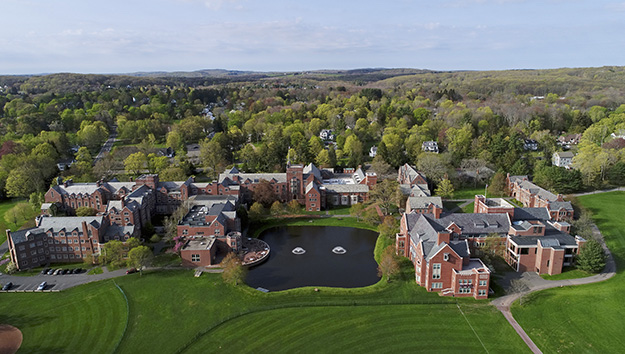In eighth grade, the increasingly awkward unit of my parents and I faced the difficult question of whether I should migrate to private school or remain in a very solid public school in my home town. I had been a legacy at a very reputable boarding school in New Hampshire, a fact that my father had subtly reminded me of by decorating my bedroom with the banner of its crest. While he never openly discussed even the possibility of my matriculating there, I was naturally inclined to take on the family mantle and attend, which seemed self-evident at 13. However, as a slender wisp of a boy with extremely low emotional IQ and little experience in independence, my mother thought it was a bad idea, as many mothers strangely balk at the idea of dropping their baby birds out of the nest with the wings still featherless and moist from the inside of the eggshell. My young pride would not be deterred, though, and I insisted on putting forth an application with the ambition of joining a friend who had gone there, embracing a more academically rigorous lifestyle, and, frankly, escaping a difficult home situation that I found myself in during the fall of 1993.
It was a strange dynamic between my recently divorced parents and I, as we found ourselves right in the tenuous epicenter of the protracted transition between parental decisions directing my life entirely and the development of my own autonomous self-actualization. But life decisions surrounding boarding school don’t wait for these dynamics to iron-out, and thus we went forward into a challenging process with a confused matrix of somewhat opposed motivations.
I arrived to the interview filled with apprehension, and even attempted a cup of coffee, which had previously been like sand to me. Though I have since repressed most of the memory, I recall not being able to look into the eyes of my interviewer, and offering only imprecise and unsure answers. In a closed door meeting with my mother, it was silently agreed that I wasn’t ready for the opportunity and was sent back to the cup of public high school to brew some more.
My freshman year of high school was subsequently a co-mingling of pleasant golden nostalgia and awkward ugly teenage youth. I had a handful of really nice girlfriends but a passive aggressive need to stab my closet door with a swiss army knife. The education was, well… fine. The textbooks were informative, the humanities teachers were intelligent and knowledgeable and kind, but at the risk of sounding snobby, the level of conversation was not as high as other institutions I would soon experience. Given the natural diversity of learning styles and ability levels at a public institution, the level of peer engagement wasn’t as high as it could be, though that was mitigated slightly by a tracking system, but that didn’t kick in until after freshman year for the humanities for the most part.
As a result of my status in the upper level of the tracking that did exist for freshman year, I could safely label myself as an “academic.” I was also in the chorus and was a part of the play, so I was able to join the smart, alternative kids pod, not to be confused with the techy pod, athletes pod, or even the type-A pod. While cliquey and clichéd, there was something extremely comforting about this as a self-identifier. If something went wrong in one phase of life, say… I was cut from the freshman basketball team (I was), I could always say to myself, “well, that’s not my thing.” To be able to hang your metaphorical hat on something in high school when everything is so vague and amorphous while also being so important, is critical. And to have that reinforced by a social pod that likewise harbored that identity, clutched to it in the ragged storm, was inexpressibly reassuring. However, while I got a great background in a number of things, I didn’t get much in the way of critical thinking by filling out a bunch of easy-to-grade worksheets and busy-work.
By the middle of my freshman year, I’d had just about enough of living at home and eagerly submitted another application to boarding school. This time, I would not be deterred. I had the grades and the intelligence to compete with the best. That was who I was at that point, after all. After pushing the application through, I was in, and overjoyed about the prospect on hacking it on my own. I signed up for the football team (and was quickly hacked down to the JV, no cuts level). One of the first days there, I poignantly remember playing tennis with a new freshman there when he mentioned he was a tennis player; I had fancied myself one as well, playing intensively during summer camps and in winter tournaments. I thought I held my own, but when I asked for his opinion of my play, he tactlessly informed me I was god-awful and could barely keep the ball in play. It was the first in a series of brutal self-disappointments.
But as school started in September, I reassured myself that academics was where I could shine. Then the classes started… It was largely untracked there, and though I began in an average level of math, that first classroom and its horrors will forever be written in chalk outlines on the inside of my brain. The teacher was removed, but the problem sets were incredibly difficult. It was an hour and a half of work for me to complete it every night, and that was for one class. So I couldn’t keep up. But worse yet, my classmates mostly could. And worse on top of that, the bulk of the class was putting homework problems up on the board for classmates to examine and critique. I was quickly no longer a mathematician, nor a writer, nor a historian, nor a scientist, and definitely under no circumstances was I a student of foreign language. By the end of the semester, I was in the bottom 2/5ths of my class with a B- average, barely. I fought like hell, mind you, I didn’t collapse entirely. Every night I did four hours of homework and not much else, but it wasn’t enough, and in a building full of people that could all perform every feat of humanity at least slightly better than me, it was constant barrage of self-reflective discouragement.
It shined a light more on my social life, but I was an underdeveloped 15, and that wasn’t much better. I attained a gorgeous Norwegian girlfriend from the next dorm over, but was ignominiously dumped by her in front of all my new colleagues when I failed in my courage to kiss her. My “love-life” at school was then barren until about senior fall. I fell in with the alt crowd of musicians who couldn’t quite keep up with the young prodigies that littered the campus and began smoking cigarettes behind the church between classes. I was welcomed in to a low level amatuer band as the singer, but other than that, my social life revolved around frisbie on the lawn, club sports, and mainly my anodyne: computer games.
When I arrived at Kenyon three years later as a freshman, I sincerely doubted that I was really good at anything. I suspected that I could write a little, that I was sociable (in the right circumstances), and I could play a little tennis. Even as I reflect on it today, 25 years later, I hear the tentative voices in my head muffling each small trumpet of pride, dating back to basement of boarding school. And yet, classes at Kenyon, by all accounts a reputable and challenging liberal arts college, were ridiculously easy for me. I could walk in and write an essay on Shakespeare without actually even reading the plays and expect at least a B+, I took freshman Bio and got an A without attending more than half of the classes or doing more than five hours of work outside the classroom all semester. Boarding school had primed my brain to blow holes in the world. The time burning in the embers of an identity inferno had turned my marrow to a hard carbon. Afterall, four hours of work a night and day times spent in the company of young geniuses can’t possibly go all to waste.
My experience seems illuminating on the pros and cons of both world, which are fundamentally different cultures, and that would include private day schools. High school is a trip to the abyss for pretty much everyone, but there are circumstances that make it significantly harder; I’m thinking particularly of a social milieu fundamentally incongruous from your emerging self, or perhaps even just centered on a concentrated version of it. Peer relationships in schooling are everything; otherwise, we’d probably see a lot more homeschooling, which tends to produce more intellectual success. If the crowd you’re rubbing elbows with every day can do everything better than you, in every category, that can be disorienting. However, it’s also awful if the median you see is indifferent and focused on drugs, alcohol and video games. Ideally, you need a Goldilocks. If you are shopping for private school education, looking for a crowd that your young applicant fits in the middle of, is paramount to identity formation. Class size, average SAT scores, endowment, and its campus facilities all pale in comparison to a school’s ability to make a student feel like they can actually matter in the world in at least one area. While it’s difficult to find, without that environment, that student is bound to have lingering feelings of inadequacy and dread when reflecting on the tender years of their late adolescence, when life began to come into focus.






